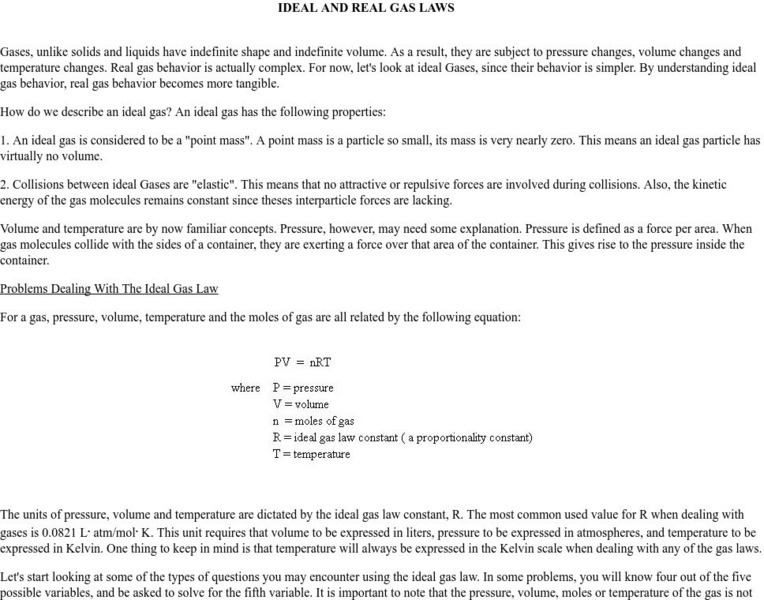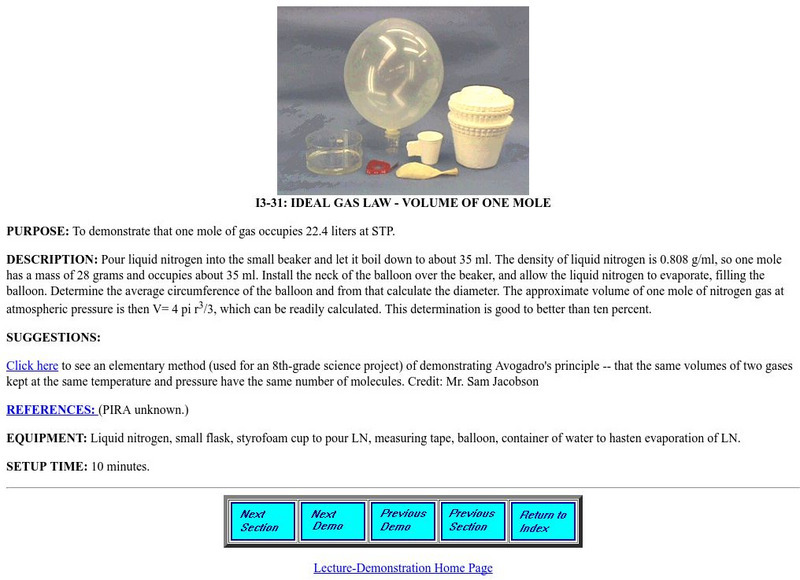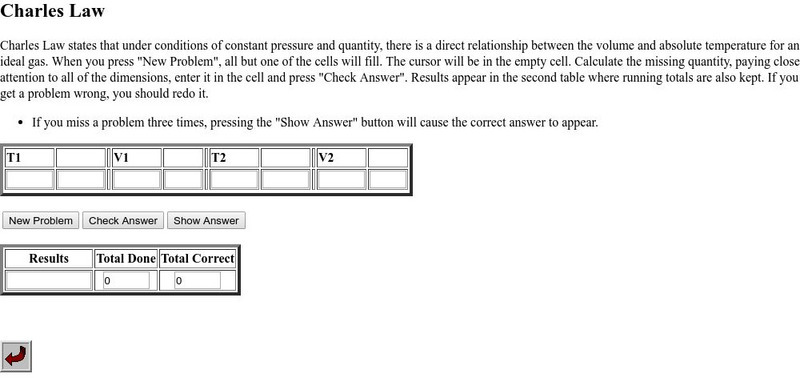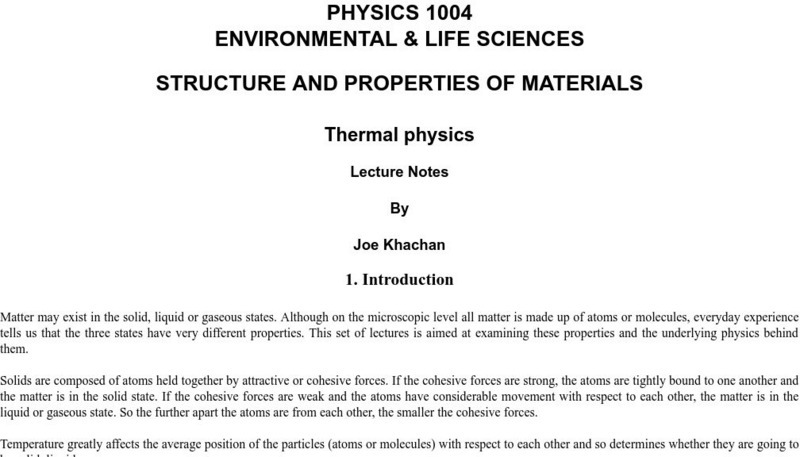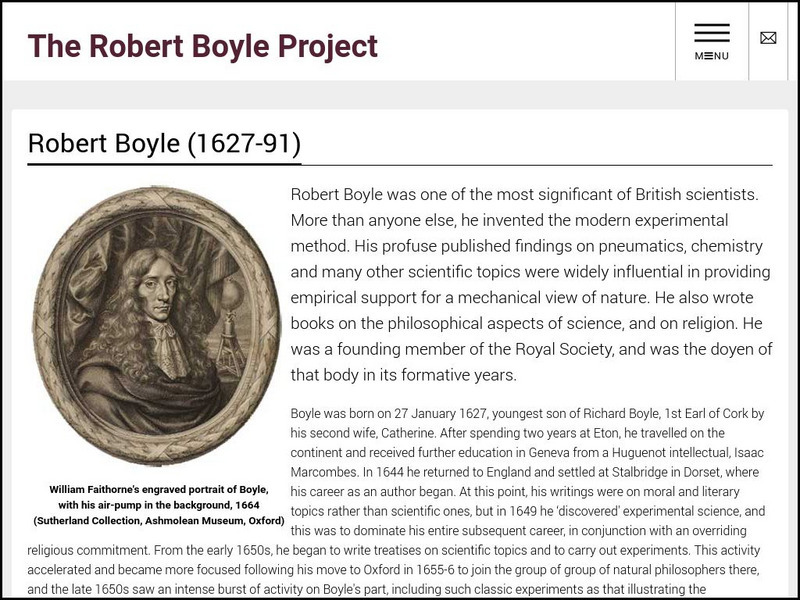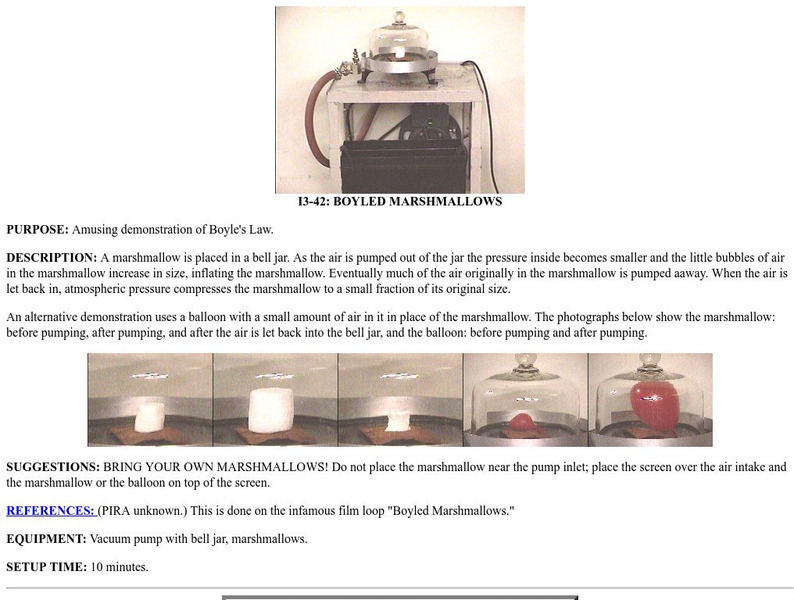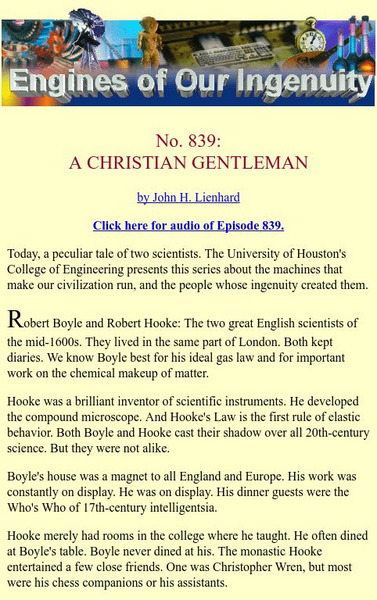Other
University California at Irvine: Introduction to Gas Laws
A set of exercises on the basics of gas laws. Includes links to several animations, although a few links are broken. Ends with a five-question quiz on gas laws.
Sophia Learning
Sophia: Ideal Gas Law Equation: Lesson 1
This lesson will explain the variables in the ideal gas law equation. It is 1 of 2 in the series titled "Ideal Gas Law Equation."
Sophia Learning
Sophia: Ideal Gas Law Variables and Relationships: Lesson 1
This lesson will explain the relationships shown by the ideal gas law. It is 1 of 2 in the series titled "Ideal Gas Law Variables and Relationships."
Towson University
Towson University: Ideal and Real Gas Laws
The ideal gas law is stated and explained at this site from the Towson University. It is then used to derive the other gas laws (Charles, Boyle's, Gay-Lussac's, Avogadro's, combined, etc.). Other gas law relationships are discussed....
University of Maryland
University of Maryland: Ideal Gas Law Volume of One Mole
A page from the University of Maryland Physics Lecture Demonstration Facility. Provides directions for a teacher demonstration of the ideal gas law. Shows apparatus and set-up; provides suggestions. Easily adaptable as a student project...
California State University
California State University: Combined Gas Law Problem Generator
Create an endless number of combined gas law problems to practice. Generator will reveal correct answer after three incorrect tries.
Wikimedia
Wikipedia: Gas Laws
This site from the encyclopedia Wikipedia provides a basic overview of the three gas laws (Boyle's, Charles', and Graham's Law) and information on the ideal gas law is found here.
Georgia State University
Georgia State University: Hyper Physics: Ideal Gas Law Calculations
A page containing an interactive JavaScript form which allows the visitor to investigate the relationship between various state variables. Visitors input values of a few variables and observe the effect upon the other variables. Options...
State University of New York
State University of New York: The Ideal Gas Law
The behavior of gases near room temperature and 1 atm pressure can be described using four main properties: amount, pressure, volume, and temperature. In this simulation the mass, pressure and temperature can be varied.
Wikimedia
Wikipedia: Boyle's Law
Wikipedia provides information on Boyle's Law, a gas law that relates the volume and pressure of an ideal gas held at a constant temperature.
California State University
California State University: Charles' Law Problem Generator
Create an unlimited number of Charles' Law problems to practice. Generator reveals correct answer after three incorrect tries.
Other
Widener University: Ideal Gas Law
At this site from the Widener University Department of Chemistry, you can try your skill with using the ideal gas law equation to solve problems. This page contains an interactive JavaScript form which delivers problem after problem. You...
University of Colorado
University of Colorado: Ph Et Interactive Simulations: Gas Properties
Experiment with this simulation to better understand the properties of gas with added variables.
Other
Universe Today; What Is John Dalton's Atomic Model?
Article explaining the legacy of John Dalton. His research into gases led to his gas laws and then his proposed atomic model. The flaws in his atomic theory are discussed also. (Jan. 20, 2016)
Mocomi & Anibrain Digital Technologies
Mocomi: What Is Graham's Law?
Definitions, formulas, and fun facts for Graham's Law, Ideal Gas Law, and the Kinetic Molecular Theory.
University of North Carolina
University of North Carolina: Properties of Real Gases
The University of North Carolina at Charlotte Chemistry Department provides slides 36-40 of this a 40-slide PowerPoint presentation. The site discuss real gases and the van der Waals equation of state. The explanation for why gas samples...
University of Sydney (Australia)
University of Sydney: Structure and Properties of Materials/thermal Physics
An exhaustive set of "lecture notes" on various topics in thermal physics (including thermal expansion). Explanations are well done and more interesting than most. Includes both a mathematical and conceptual treatment of topics. Humor,...
Other
The Robert Boyle Project, University of London
Official homepage of Robert Boyle (1627-1691 CE). The site is very comprehensive in its information about Boyle. The site has links to a bibliography, his works, correspondence, etc.
University of Maryland
University of Maryland: Boyled Marshmallows
A page from the University of Maryland Physics Lecture Demonstration Facility. Provides directions for a teacher demonstration of Boyle's law. Shows apparatus and set-up; provides suggestions. Easily adaptable as a student project or lab...
Michael Blaber, PhD
Florida State University: Gases: Gas Mixtures & Partial Pressure
Avogadro's law is stated in equation form. The lesson does not include much discussion, but it does relate the partial pressure and the total pressure of a gas sample to the mole fraction of its components.
Other
Washington University: Chemistry Behind Airbags
This site from the Chemistry Department at the Washington University provides informaiton on airbags. A lot of gas properties find their way into airbags, and this site goes into a great deal of it. Worth a look for the real world...
Michael Blaber, PhD
Florida State University: Gases: Ideal Gas Equation
The ideal gas law is derived from the empirical gas laws. The ideal gas law equation of state is listed and discussed. The universal gas constant is explained and its value is listed in five different sets of units. Standard temperature...
University of Houston
University of Houston: Engines of Our Ingenuity: A Christian Gentleman
The transcript of a talk given on the syndicated radio broadcast titled "The Engines of Our Ingenuity." The story contrasts the lives and personalities of two scientific colleagues - Robert Hooke and Robert Boyle. Discusses their...
Ohio State University
Ohio State University: Kinetic Molecular Theory
Lecture notes for a college chemistry course give the basic principles of KMT. Does get into some of the gas law derivations.



